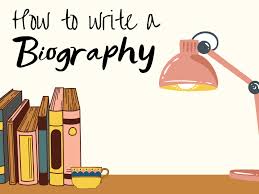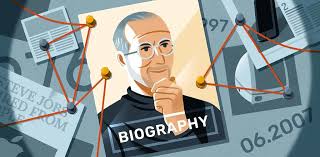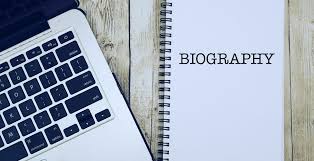![]()
If you’ve landed on this article page, you’re probably searching for a
good business idea—an idea that’s light on the pocket but heavy on
returns, promising both a fulfilling journey and potential profit.
|
How to Become a Biography Writer in Nigeria
A biography is the story of one’s life which when written by the
subject becomes an autobiography. A memoir is also a biography
or autobiography but concerned more with the subject’s career
and public life. Understanding these terminologies will help you
on your journey to learning how to write an autobiography.
Autobiographies and memoirs are often written with the
assistance of professional freelancers. By prior mutual
agreement, this fact can be hidden. When anonymous, the paid
author or co-author becomes the ghostwriter. He/she is paid off
and loses all future claims to authorship or co-authorship of
the work.
Generating an outline is like drawing the building plan for a
construction project. As with building construction, the outline
is of existential consequence for the biography or autobiography
project.
In the classical
biography, the outline follows a chronological order beginning
with family genealogy, birth, childhood, education, career, and
so on.
But with a memoir, the outline is episodic dwelling on the
milestones in the subject’s career path and public life. The
freelancer must work with the subject-client to tease out a
workable outline.
Since the chapters of the resultant book will mimic the outline,
a grouping of topics in the outline is to be done with an eye
for coevality and volume. By coevality, I mean those events that
occurred around the same period of time.
These should naturally be grouped together. However, the chances
of overlap of references to the same event are always there. And
this shouldn’t be a worry at the outline stage.
How To Group Your Headings and Sub-Headings.
While grouping the headings and sub-heads, the writer should be
sensitive about achieving approximate uniformity in the volume
of each chapter. This is to forestall a scenario where one
chapter is five pages long, while the other is twenty-five pages
long.
The autobiographer or biographer has a duty at this stage to
tease out as wide a range of events and occurrences as possible.
This should include their ramifications done by asking the kind
of searching questions that will help the subject clarify fuzzy
connections.
In other words, this is not the time for minimalism. Rather, it
is the time to be expansive.
Understand that the outline will form the compass for the
project. Just as architects take one section of the project and
blow it up for details in the plan, the biographer also has to
explore the detours and subheads to the main headings and
events.
In the run-up to beginning the biography or autobiography and
having drawn up the outline, one should prepare oneself with
background research. This step is important for autobiographers,
biographers, and memoirists.
Many writers wonder how to find materials for their
autobiographies and biography projects. If you’re such a writer,
you should consider exploring the most popular sources of
research materials.
The oral sources would include relations and workplace
colleagues of the subject. However, these sources needn’t be
approached at the onset until the outline progresses and these
sources’ perspectives become relevant.
The ethics of the business demands that the freelancer must
obtain the client’s fiat before speaking with these third-party
sources. In the sub-genre known as unauthorized biography
however, the freelancer operates more like a sleuth to unearth
what may not be favorable to the subject which makes the
requirement for the subject’s prior approval unnecessary.
One of such unauthorized biographies happened by serendipity in
Nigeria in relation to a man of letters who fell out with his
biographer. Interesting right?
Also, the volume is often a source of worry to many writers who
are in the process of figuring out how to compose an
autobiography or biography.
The perfect volume for your autobiography or biography
Many prospects for autobiographies think because the story of
their life appears huge to them, it can actually make a good
volume in book form. For others, it is a question of not having
the ability of a raconteur to tell their story in a compelling
way.
Many who think of their story as vast start off well, but end up
with something very scanty. This is where the professional
freelance biographer comes in to help achieve your dream of
writing a biography.
Again, many biography prospects do involuntary self-censorship
of their stories or adopt a minimalist approach believing the
reader would not be interested in the details.
If you’re experimenting with styles and ways to write an
autobiography, you can adopt the strategies of professional
biographers. Put in a lot of details.
It is better to over-write and cut than under-write and
look for augmentation.
Include Your Own Opinions.
As the biographer, you have a unique perspective and role in
shaping the person’s life story. Don’t hesitate to express your
own thoughts and reflections about the subject within the text.
Take the opportunity to analyze and provide commentary based on
your research, offering your personal insights and
interpretations of the person’s character and significance.
Proofread The Biography.
Thoroughly review the biography for any spelling, grammar, and
punctuation errors. Pay close attention to punctuation marks and
verify their correctness by circling them in the text.
Additionally, consider reading the text backwards to identify
any hidden spelling or grammar mistakes that may have been
overlooked during regular reading. This reverse reading
technique can help pinpoint errors that might otherwise go
unnoticed.
Focus On Major Events And Milestones.
Significant occurrences encompass pivotal moments such as
marriages, births, and deaths within the individual’s life.
These milestones may include noteworthy achievements like a
successful business venture or participation in a significant
civil rights march. By emphasizing these key events, the reader
understands what held significance to the person and how their
actions influenced the world around them.
Identify a Major Theme
Or Pattern In The Person’s Life.
Examine your research materials for commonalities among events
or occurrences throughout the person’s life. Look for any
recurring phrases or situations that arise in their experiences.
For instance, you might observe a recurring theme of adversity
in the person’s life, where they consistently faced challenges
and diligently struggled against formidable obstacles. In such
cases, you can incorporate the theme of overcoming adversity
into the biography, highlighting their resilience and
determination.
Use Flashbacks
Flashbacks involve transitioning from the present to the past in
the narrative. This technique allows you to incorporate scenes
from the subject’s past within the biography. You can begin with
a present moment and then introduce a scene from the person’s
past, or you may opt for alternating chapters focusing on the
present and the past.
When utilizing flashbacks, it is important to ensure that the
past scenes are as vivid and immersive as the present-day ones.
Drawing upon your research notes and interviews with the subject
will help you understand their past thoroughly and enable you to
portray detailed and realistic flashback sequences in the
biography. By skillfully integrating these flashbacks, you can
provide valuable insights into the subject’s life journey and
enhance the overall narrative structure.
How To Get Payment For The Writing Project.
Except the writer has achieved name recognition in the trade of
biographing, there’s always the prospect of being regarded with
suspicion by most clients. One way to assuage this suspicion is
to agree to a Pay-As-You-Go arrangement.
This aspect might come in handy for anyone who’s in the process
of figuring out how to write an autobiography. Chances are that
you might want to employ the services of a professional
biographer.
In a Pay-As-You-Go arrangement. the client pays on a pro-rata
basis as the manuscript progresses according to the outline.
(This is another raison d’etre for the outline). If the project
does not go to full term and gets aborted midway, neither party
would feel short-changed.
When the full manuscript is ready, a professional book editor
should be engaged to edit it. This goes beyond spellings and
typos and nothing can fully capture all the ways in which a good
editor can improve a literary piece.
Sections of the story
with legal implications should be shown to a lawyer. An
experienced lawyer will do a good job of vetting your book for
possible libel. It is the duty of a good freelancer to not
presume to be a Jack of all Trade in these matters. It is wise
to advise the client as a fiducial power.
Talking of the fiduciary relationship between the client and
freelancer on a biography project – this cannot be overstated.
The implication of this for the freelancer is that all
information received in the process should be treated as
privileged and of confidential nature.
|







